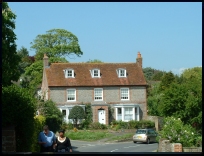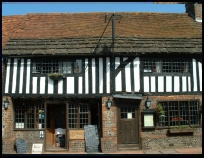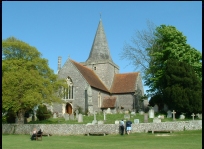| |

|
|
|
| |
 The area around Alfriston in East Sussex must have been occupied from neolithic times
as a number of barrows from this period have been found higher up the
surrounding Downs . The area around Alfriston in East Sussex must have been occupied from neolithic times
as a number of barrows from this period have been found higher up the
surrounding Downs .
Alfriston lies in the Cuckmere valley just off the main A27 Eastbourne to Lewes road.
The village was settled long before the Norman invasion of 1066 , as the mound
that the church lies on was an old Saxon burial ground. St Lewinna a Saxon
virgin Christian was killed by the Saxons in 690AD and her body was kept at the
church, her relics were attributed to a number of miracles. They were
stolen by a monk from Belgium and transported to the Priory of Bergue
St Winox in 1058.
King Alfred was believed to have burnt the cakes at the Star Inn in the village,
this is possible as he had his palace a few miles away at West Dean .
The majority of the church of St Andrews was built in the 1300's and is known
as The Cathedral of the Downs. The rectory was built in the 14th century and
is of wattle and daub construction. This building is now owned by the National
Trust, and is open to the public.
The Star Inn it is believed was built as a hostel by the Abbot of Battle.
In the 1500's it was turned into an Inn with numerous wooden figures looking
down on passing travellers, these figures still remain watching. Outside the
Inn is a red Lion, once the figurehead of a Dutch ship which was wrecked in
the 1800's and was raided by Stanton Collins and his smugglers. Many of the
old buildings in the village are tiled in Horsham Tiles .
Towards the end of the 1700's the son and heir of the Chowne family, who owned
Place House Estate, went for a walk with his dog, and was attacked by thieves.
He was killed by a blow to the head, and the thieves buried the young man.
Seven years later, a couple were walking along the road, and saw a small
white dog that walked into the bank of the read. Every seven years the
phantom dog returned until the early 1800 when the skeleton of a young man
was found while the road was being widened, his bones were moved to the church
and the ghostly dog never reappeared.
During the Napoleonic Wars Alfriston was the home to a large number of
troops, they were to have been there to repel the invaders should they
have got past the Martello towers and the cliffs on the coast. The village
gained from this friendly invasion by providing food drink and other
services to the troops.
After the Napoleonic wars the village turned to smuggling, and the
Alfriston gang, well known for their violence, used the Cuckmere river
to bring the illegal goods in to the village. The gang was broken up when
the leader Stanton Collins was caught for sheep rustling in the early
1830's and transported to Australia.
Nowadays the village is a tourist attraction with its many old buildings
and its feel of an ancient time. |
|
 Alfriston in East Sussex has many beautiful views within the village, looking at the Star Inn
can keep you occupied for quite a while with its figures.
The high street is a beautiful example of an old Sussex village, and has many
beautiful old buildings.
The area near the church and river Cuckmere is very pretty and it is enjoyable
just walking around the village. Above the Grizzly Bear shop is a very
interesting historical exhibition of the village and this is worth visiting. Alfriston in East Sussex has many beautiful views within the village, looking at the Star Inn
can keep you occupied for quite a while with its figures.
The high street is a beautiful example of an old Sussex village, and has many
beautiful old buildings.
The area near the church and river Cuckmere is very pretty and it is enjoyable
just walking around the village. Above the Grizzly Bear shop is a very
interesting historical exhibition of the village and this is worth visiting. |
|
 Alfriston in East Sussex has a wide range of shops with the emphasis on gift shops, antiques
and food establishments, showing the influence that tourism now has on the
area. Alfriston in East Sussex has a wide range of shops with the emphasis on gift shops, antiques
and food establishments, showing the influence that tourism now has on the
area.
The nearest trains run from the station at Berwick about 2 miles to the north.
The shopping centre of Lewes lies about 6 miles to the north west. |
|
| Alfriston is shown as the red symbol on the map. |
|
|
Nearby Villages
(click on symbol to see the village page) |
| Village= | |
Town= | |
Recorded in Domesday= |  |
| |
|
|
Alciston |
(Fifty thousand tiles on the Barn) | | 1.78 miles |
|
|
Arlington |
(Peaceful Saxon Village) | | 3.09 miles |
|
|
Beddingham |
(At the base of Mount Caburn) | | 5.61 miles |
|
|
Berwick |
(Sharpen your arrows on the Church) | | 1.14 miles |
|
|
Bishopstone |
(Largest Tide-Mill in Sussex) | | 3.23 miles |
|
|
Chalvington |
(The miniature church) | | 3.96 miles |
|
|
Denton |
(Earl Godwins Manor) | | 4.25 miles |
|
|
East Blatchington |
(Mutiny and the Edge of Space) | | 3.20 miles |
|
|
East Dean |
(Fishing and Wrecking) | | 4.14 miles |
|
|
Exceat |
(Alfred the Great's Naval Base?) | | 2.26 miles |
|
|
Folkington |
(Teasles and Badgers) | | 2.35 miles |
|
|
Friston |
(Home of the Railway Children) | | 3.68 miles |
|
|
Glynde |
(Home of English Opera) | | 5.39 miles |
|
|
Hailsham |
(Ropes and Napoleon) | | 5.85 miles |
|
|
Jevington |
(Smugglers and Churchill Tanks) | | 2.81 miles |
|
|
Litlington |
(Secret marriage of George IV) | | 1.18 miles |
|
|
Lullington |
(destroyed by Cromwell ??) | | 0.42 miles |
|
|
Polegate |
(Fine old Tower Mill) | | 3.99 miles |
|
|
Seaford |
(The cormorants or shags) | | 3.42 miles |
|
|
Selmeston |
(Tomb to store the Contraband) | | 2.54 miles |
|
|
Tarring Neville |
(The Chest from the Spanish Armarda) | | 4.97 miles |
|
|
Wilmington |
(The Long Man) | | 1.69 miles |
|
|
Firle |
(Home of the Greengage) | | 4.01 miles |
|
|
| Copyright Villagenet 1998-2025 | |
| |
|
|
Local Interest
Just click an image |
|
|
|
|
|
|
|
|
|
|
|
|
|
|
| |